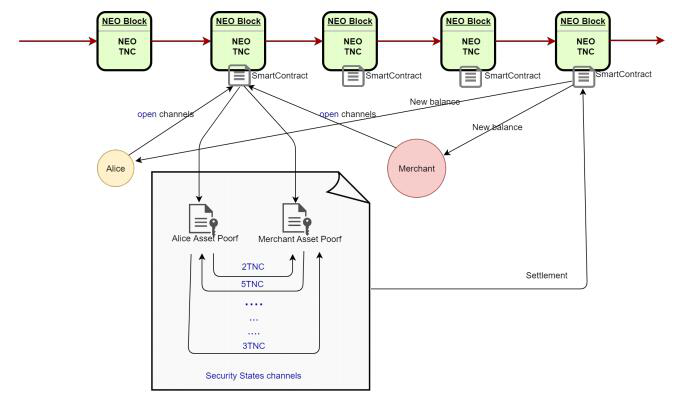-
Cryptocurrencies
-
Exchanges
-
Media
All languages
Trinity is a general off-chain expansion solution, which uses asset proof to perform on-chain credit endorsement and status channel for off-chain transactions, thereby achieving instant payment of assets, low-cost transactions, and good scalability and transaction privacy protection.
Trinity is committed to helping users use blockchain services conveniently, quickly and securely by providing fast and secure off-chain payment channels.
Technical implementation
1. Asset Proof
In the off-chain expansion scheme, asset proof is a key factor, equivalent to settlement reserve, which is achieved by using digital signatures and hash lock transmission, that is, it collateralizes the digital assets on the main chain and trades.

In the above figure, assume two transaction participants, one is Alice and the other is Merchant. Asset proof means that Alice and Merchant need to collateralize the token assets on the main chain to eventually generate asset proof. For example, Alice owns 1,000 NEO NEP-5 assets, and Merchant owns 1,000 NEO NEP-5 assets. Before the off-chain transaction transfer, the tokens of both can be collateralized and frozen as proof of assets in the required amount. If the asset proof cannot be generated, token transfer cannot be made. Asset Proof is a binding protocol executed on the NEO blockchain. Through digital signatures, ensure that both parties to the transaction cannot withdraw from the value transfer at will. In addition, in off-chain transactions, only both parties to the transaction can access to the tokens in the smart contract with payment channels, which means that Trinity asset proof is as binding as the main chain transaction.
Once the main chain token assets are frozen, both parties to the transaction generate asset proof, and both parties can immediately conduct off-chain transfer transactions through the payment channel without being restricted by the number of times. When both parties complete the transaction, the assets can be transferred back to the main chain and the asset balance changes are registered on the main chain. Off-chain transactions will not be recorded, that is, information such as how many times the transactions are traded, the number of transactions will not be broadcast to the entire network, protecting user privacy.
2. Smart Contract
The smart contracts deployed on the chain mainly provide the following functions:
1) Provide a shared trading rule that both parties can identify simultaneously by both parties
2) Issuing certified transaction tokens to provide protection for off-chain payments
3) Intelligent arbitration. If one of the parties to the transaction breaks the contract, the smart contract can impartially award and punish the person who breaks the contract
4) Channel management, close the channel, settle off off-chain transactions and then publish them on the chain
3. Status channel
Trinity manages state channels through smart contract authentication participants on the chain, locks/unlocks margins, and adjudicates disputes, and realizes off-chain transactions through Trinity off-chain protocol.
Off-chain transaction
All transactions off the chain must be encoded in the format of asset proof to ensure the communication consistency and security of the channel. This information includes:
1) Transaction sequence
2) Number of transfers
3) Hang
4) Trading the root node of the Merkel tree
5) Signature containing all the above content
Application Scenarios
The core of Trinity is the state channel. In order to make the state channel used by more users in order to build the entire micropayment ecological habit, the state channel itself is free. That is, it does not hold any TNC, and it can also be used as a basic state channel service provided by Trinity.
Trinity In order to ensure the availability of state channels, many participants need to work together, and TNC can play an important incentive and balance role.
TNC usage scenarios:
1) Unified network settlement assets
When establishing a channel, use TNC as asset collateral, which not only provides an easy-to-use unified settlement method, but also provides a small and medium-sized nodes or users who do not want to and have synchronized resources on the entire chain, using TNC is the most direct and convenient way. The unified settlement mechanism reduces unnecessary redemption overhead for off-chain and on-chain transactions.
2) Trinity network construction reward
Trinity provides the routing of state channels to enhance the transaction convenience of the entire network. Due to the existence of channel routing, the channel can effectively interact and transmit state values between multiple users or nodes, which provides Trinity network with higher flexibility and convenience. As a network point, TNC can effectively reward the intermediate state channels routed through the channel, so that more nodes or users are willing to participate in the network channels, providing guarantees for more efficient asset circulation.
3) Value-added Services of Trinity Network
Trinity is a network that attaches importance to privacy protection. It uses a number of technologies including zero-knowledge proof and mixed currency transactions to ensure the security of data and enhance user privacy protection. In the Trinity network, TNC can be used to pay for more privacy protection services.
Trinity network nodes also provide value-added services such as state channel QoS, connection-oriented channel routing, light client gateway services, channel state detection proxy services, etc. These nodes can obtain rewards for providing value-added services by charging TNC.
DAPP developers can also customize value-added services based on Trinity's channel service layer. These value-added services can be provided to users of the Trinity network for direct use. DAPP developers can get compensation by charging TNC.
4) Internet service fees
The Trinity Network is committed to providing services for small and medium-sized enterprises with digital assets. For small and medium-sized enterprises that use the Trinity Network to publish or manage digital assets, TNC can be used to cover the service fees required.
5) Enterprise custom service fee
If some companies need customized services, such as their own independent state channel nodes and highly customized wallets, these customization fees need to be provided in the form of TNC.
6) Incentives for TNC holders and community developers
For developers who continue to pay attention to and support the Trinity community, Trinity will reward them through TNC tokens to attract more outstanding developers to join Trinity’s community development, and continuously improve and optimize the Trinity protocol.
For users who hold TNC, Trinity will regularly issue TNC to TNC holders in a reward manner to encourage more people to participate in Trinity's network construction.
As the entire Trinity network continues to develop, the number of collaborators participating in it continues to increase, and the use scenarios and value of TNC will continue to increase.











